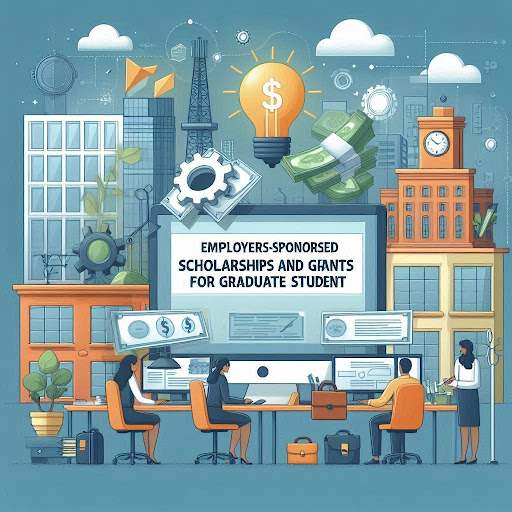Employer-Sponsored Scholarships And Grants For Graduate Students: An In-Depth Guide
Pursuing graduate studies can significantly enhance your career prospects, providing advanced skills and knowledge that can propel you to higher positions within your field. However, the cost of graduate education can be a substantial barrier. One often overlooked resource for funding is employer-sponsored scholarships and grants. Many companies recognize the value of investing in their employees’ education and offer financial assistance to support their academic pursuits. This comprehensive guide explores the landscape of employer-sponsored scholarships and grants for graduate students, including benefits, types of programs, application processes, and tips for maximizing these opportunities.
1. Benefits of Employer-Sponsored Scholarships and Grants
Employer-sponsored scholarships and grants offer several advantages to both employees and employers:
a. For Employees:
– Financial Support: Alleviates the financial burden of tuition fees, textbooks, and other educational expenses.
– Career Advancement: Enhances skills and qualifications, increasing prospects for promotions and higher salaries.
– Job Security: Demonstrates a commitment to professional development, which can be a factor in job retention and career growth.
– Networking Opportunities: Provides access to professional networks and mentors within the organization.
b. For Employers:
– Employee Retention: Encourages employee loyalty and reduces turnover by investing in their development.
– Enhanced Skills: Ensures employees acquire advanced skills and knowledge that benefit the organization.
– Attracting Talent: Makes the company more attractive to prospective employees who value educational support.
– Workplace Innovation: Fosters a culture of continuous learning and innovation.
2. Types of Employer-Sponsored Programs
Employer-sponsored educational assistance programs can take various forms, each with unique features and benefits:
a. Tuition Reimbursement Programs
These programs reimburse employees for tuition and related expenses after they have successfully completed a course. The reimbursement may cover all or a portion of the costs, depending on the company’s policy.
b. Scholarships and Grants
Some employers offer scholarships or grants that provide upfront funding for educational expenses. These awards may be competitive, requiring an application and selection process.
c. Partnership Programs
Employers may partner with specific universities or educational institutions to offer discounted tuition rates or tailored programs for their employees. These partnerships can provide significant cost savings and customized learning experiences.
d. Professional Development Funds
Companies may allocate funds specifically for professional development, which employees can use for graduate studies, certifications, conferences, or other educational activities.
3. Examples of Employer-Sponsored Programs
Several prominent companies and organizations offer robust educational assistance programs for their employees:
a. Google
Google provides generous tuition reimbursement for job-related courses and degree programs. Employees can receive reimbursement for up to $12,000 per calendar year, covering tuition, fees, and required books.
b. Deloitte
Deloitte offers the Graduate School Assistance Program (GSAP), which provides financial support for employees pursuing a master’s degree in business-related fields. The program includes tuition reimbursement, salary continuation, and mentorship opportunities.
c. Boeing
Boeing’s Learning Together Program (LTP) covers tuition, books, and fees for degree programs and individual courses at accredited institutions. The program is available to both full-time and part-time employees.
d. Procter & Gamble
Procter & Gamble offers tuition assistance for employees pursuing undergraduate and graduate degrees. The program covers up to 80% of tuition costs for approved programs, with a maximum annual benefit.
4. Application Process
Applying for employer-sponsored scholarships and grants typically involves several key steps:
a. Review Company Policies
Start by reviewing your company’s educational assistance policies. This information is often available through the human resources department or employee handbook. Understand the eligibility criteria, application process, deadlines, and any conditions or restrictions.
b. Discuss with Your Supervisor
Speak with your supervisor or manager about your intention to pursue graduate studies and seek financial assistance. They can provide guidance, support, and necessary approvals for your application.
c. Prepare Your Application
Prepare a comprehensive application, including required forms, transcripts, proof of enrollment, and any other requested documentation. Some programs may require a personal statement or essay outlining your educational goals and how the program aligns with your career objectives.
d. Submit and Follow Up
Submit your application according to the guidelines and deadlines specified by your employer. Follow up with the appropriate department to confirm receipt and inquire about the timeline for decisions.
5. Maximizing Employer-Sponsored Opportunities
To make the most of employer-sponsored scholarships and grants, consider the following tips:
a. Align Educational Goals with Company Objectives
Choose a graduate program that aligns with your current role or future career aspirations within the company. Demonstrating how the program will benefit the organization can strengthen your application.
b. Maintain Strong Academic Performance
Many tuition reimbursement programs require successful course completion with a minimum grade. Strive to maintain strong academic performance to ensure continued eligibility for financial support.
c. Utilize Internal Networks
Leverage internal networks and mentorship opportunities to gain insights and advice on navigating the educational assistance program. Colleagues who have previously benefited from the program can provide valuable guidance.
d. Stay Informed
Keep abreast of any changes to your company’s educational assistance policies or new opportunities that may arise. Regularly check internal communications and updates from the human resources department.
Employer-sponsored scholarships and grants for graduate studies offer a valuable avenue for employees to further their education while minimizing financial strain. By understanding the types of programs available, effectively navigating the application process, and aligning educational goals with company objectives, employees can take full advantage of these opportunities. For employers, investing in employee education fosters a skilled, loyal, and innovative workforce, ultimately contributing to organizational success.







